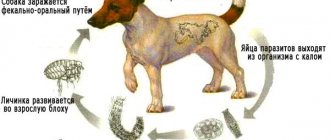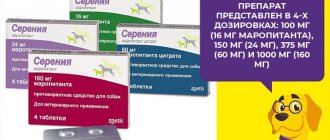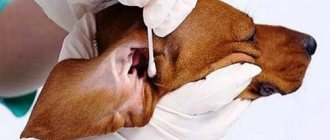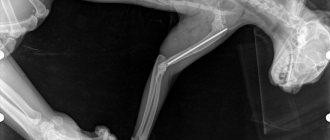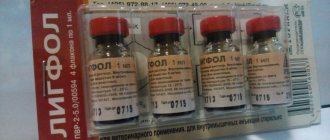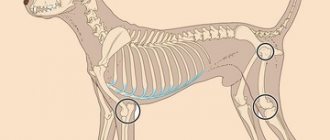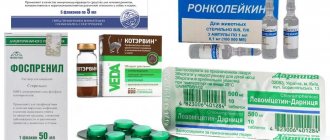About the manufacturer
The manufacturer of the veterinary drug Propalin is the French pharmaceutical giant Vetoquinol. Founded in 1962. The headquarters of the organization is located in MANY-VERNOIS LUR (France).
The company's field of activity is the production of pharmaceuticals, including veterinary products. VETOKINOL has production bases in 6 countries and its products are distributed on all five continents. The main principle of the team of professionals of the corporation, which has managed to maintain the status of a family enterprise, is constant concern for the health of animals. VETOKINOL is among the Top 10 global manufacturers of veterinary drugs.
What is Propalin used for?
The main purpose of the drug is the treatment of uncontrolled urination, the cause of which is sphincter dysfunction. It doesn’t matter what reasons lead to this - age-related changes, recent surgical interventions, obesity, etc.
Important: like any other veterinary drug, Propalin must be used under the strict supervision of a veterinary specialist. Only a doctor prescribes the drug after a complete examination. If there are other reasons leading to urinary incontinence in a dog, Propalin will not have an effect, and may possibly lead to negative consequences.
Why is the drug "Propalin" prescribed?
The medical drug "Propalin" for dogs is used to treat urinary incontinence due to bladder dysfunction. Dysfunction of the urinary system in a pet can occur for several reasons:
- as a result of age-related changes;
- weakening of the dog's bladder sphincter;
- negative consequences of sterilization (castration) of an animal;
- various diseases, infections.
In the case of the latter, the problem of urinary incontinence may disappear after treatment of the infection or disease and there will be no need to prescribe additional “Propalin” for dogs (an analogue of the drug).
Composition and pharmacology
Propalin for dogs is available in the form of a solution for oral administration (suspension). The drug is packaged in bottles of different sizes - 30 and 100 ml. The bottle comes with instructions and a syringe that helps you measure the dose recommended by a specialist and inject the medicine into the dog’s mouth.
It is worth strictly monitoring the shelf life of the drug - one year from the date of manufacture in a closed container and three months after opening the package.
Compound:
- the main active ingredient is phenylpropanolamine hydrochloride (norephedrine) - 50 mg/ml. It is of synthetic origin;
- excipient - sorbitol solution (70%).
Please note: contraindications, overdose
It is important to remember: a veterinary clinic doctor should prescribe the drug “Propalin” for dogs (an analogue with the same active ingredient), and also determine the dosage in each individual case. The same specialist will definitely warn you about existing contraindications to the use of Propalin. The drug in question is not prescribed in the following conditions:
- the animal's hypersensitivity to the main components that make up Propalin was revealed (a visible side effect may occur - various allergic reactions);
- during pregnancy (lactation) of an animal;
- if anticholinergic drugs, antidepressants, or any sympathomimetics have been previously prescribed and are currently being used.
No less dangerous is the incorrectly calculated amount of the drug used at a time. The consequence of this may be an overdose. This phenomenon can be determined by the following signs:
- the dog has shortness of breath;
- the animal's pupils are noticeably dilated;
- The dog is acting restless.
If one or more of these symptoms are detected, the owner must immediately take the pet to the veterinarian.
How does the drug work for dogs?
The main active ingredient is able to activate the sympathetic nervous system and normalize some automated reactions of the dog’s body. After taking the drug at the indicated dose, the tone of the urinary flow and the urethral sphincter increases, and its contractile function increases.
In addition, as a result of the action of Propalin, a narrowing of blood vessels occurs; the secondary effect of the drug is:
- stimulation of the nervous system;
- increased blood glucose levels.
The maximum concentration of Propalin in the dog’s blood plasma is achieved 1.5 hours after administration. In unchanged form, the drug is excreted from the animal’s body without accumulating in it.
It is important to consult a specialist who will not only determine the dose, but also the period for which the dog should take it.
Long-term use of the medicine leads to a lasting result: the smooth muscles around the urethra become elastic, urination occurs after the dog’s conscious effort.
Indications for use
Owners should remember that if a small puppy moves into the house, he will not immediately learn to control the urge to urinate. It is during this period that the presence of pathology can be missed. It is necessary to monitor the baby, if, after reaching 6 months, he has not learned to at least partially control himself, this is a reason to go to the clinic. After an examination, the doctor will be able to determine the cause. Perhaps it's psychological.
Propalina for dogs is prescribed when the urethral sphincter is weakened. The drug is effective only for this cause of incontinence. Identification of diseases of a different etiology will lead to the prescription of other drugs. Most often, weakening of the urethral sphincter is observed in dogs:
- in the postpartum period in bitches, when the muscles lose tone;
- during the recovery period after an infection;
- during the recovery period after sterilization/castration surgery;
- for injuries;
- with hormonal imbalances.
Note that sphincter pathologies can be congenital. Some dog breeds have a genetic predisposition to urethral sphincter weakness - huskies, Labradors, huskies, English bulldogs.
Important: Propalin is prescribed only to spayed females (after ovariectomy/ovariohysterectomy).
How to use (instructions)
Let us note once again that self-administration of the drug Propalin to a dog is prohibited. The dose and duration of administration should also be determined by a veterinarian.
In the instructions for the drug, the manufacturer provides recommended doses depending on the weight of the animal.
| BREED | NUMBER OF DAILY APPLICATIONS | DOSAGE |
| Fine/medium | 2-3 |
|
| Large | 2-3 |
|
Important: Propalin for dogs is most often used as part of complex treatment. Consultation with a veterinarian is necessary, since the drug cannot be prescribed with a number of drugs at the same time.
Propalin for dogs: dosage, instructions for use
Despite the safety of the drug, it is given only according to the instructions and recommended dosage of the doctor. The suspension should have a good shelf life (2 years from the date of production), stored in a dark place where there is no direct sunlight. An open bottle is used within 90 days.
Dosage calculation
The dosage of Propalin for dogs is calculated based on the weight of the pet and the frequency of taking the medicine. The standard dosage regimen looks like this (small/medium individual - up to 25 kg, large - more than 25 kg.)
| Breed | Number of appointments per day | Dosage |
| Fine/medium | 2 | 3 drops per 1 kg |
| 3 | 1 drop per 2 kg | |
| Large | 2 | 0.75 ml per 25 kg |
| 3 | 0.5 ml per 25 kg |
For puppies, the drug is prescribed only by a veterinarian, given at the rate of 1 drop per 2 kg of weight.
How long to give Propalin to a dog depends on the state of health and the reasons that caused the weakening of the sphincter. Elderly pets receive treatment continuously; after pregnancy and childbirth, bitches take a course of the drug. The duration of treatment is determined by the doctor.
How to properly give Propalin to a dog?
The suspension is given to pets 2-3 times a day along with food. If the dog senses a foreign odor in the food and refuses it, you can use a syringe to inject liquid into the oral cavity. To do this, shake and open the bottle, draw the desired dose into the syringe (release air so that the amount of medicine is displayed correctly). Further:
- Hold the animal's head between your knees or ask a family member to hold it with their hands.
- Carefully open the mouth.
- Slowly pour the medicine onto the root of the tongue.
- Close your mouth, slightly raise your head so that the dog swallows the liquid.
When taking the medicine, hold the bottle at an angle. If there is little suspension left, spin the bottle to collect the remaining residue from the bottom.
After taking the drug, keep the dog in sight for 5-10 minutes, it is important that he does not regurgitate the syrup. Rinse the syringe after each use. When taking medication continuously, it is important to monitor the animal’s weight so that if it loses weight or gains a kilogram, the dose can be adjusted. A veterinarian examination is carried out every six months.
How to give to a dog
The algorithm for taking the drug is simple:
- Unscrew the cap of the bottle and prepare a plastic dispenser.
- To avoid filling the syringe with the medicine with air bubbles (reducing the dose), filling must be done from a bottle tilted at an angle.
- Pull the dispenser piston up until the required dose is in it.
- Insert the syringe into the dog’s mouth (on the side between the molars) and pour in the suspension.
It is allowed to mix the medicine with food.
Important: after taking Propalin, you should watch the dog for several minutes - it is possible that the administered dose may regurgitate.
Contraindications and side effects
The synthetic drug has a number of contraindications for use:
- state of pregnancy, lactating bitches;
- reproductive bitches;
- diseases of a different etiology other than sphincter weakness. For example, inflammation of the bladder;
- chronic pathologies of the kidneys and liver.
Rarely seen:
- stool disorder;
- increased nervousness, restlessness;
- increased blood pressure;
- hypersalivation;
- rapid breathing.
A significant overdose will lead to convulsions, vomiting, increased heart rate, and tremors of the limbs.
Analogs
The high cost of the drug forces many owners to look for analogues. Note that veterinary products with a similar composition and effect do not have a significantly lower price. But it’s worth knowing their names in case Propalina isn’t available at your nearest pharmacy:
Ovestin
Hormonal drug. It is used in cases where the cause of sphincter weakness lies in low estrogen levels in bitches. Available: ointment, tablet form, suppositories.
Uristop
Used for functional dysfunction of the urethral sphincter.
How to replace "Propalin": analogues
Despite its effectiveness, the main disadvantage of the medicine is its too high demand and its regular absence from pharmacies, especially in small towns. In addition, the price of this medication is relatively high. In this regard, the question of how and what can be replaced with “Propalin” is very relevant. Analogs for dogs suffering from urinary incontinence should also be discussed with the treating veterinarian.
Today, the only medicine that can be fully called identical to “Propalin” is the drug for people “Dietrin”. Despite the fact that this medicine is prescribed for other purposes, the main active component of Dietrin is the same - phenylpropanolamine hydrochloride. This makes it possible to temporarily or permanently replace Propalin for dogs. The analogue should be used with caution, observing the dosage calculated by the veterinarian.
Important! There are two medications sold in pharmacies under the name “Dietrin”. One of them is essentially a dietary supplement and cannot replace “Propalin” with it. You can distinguish these products by reading the composition on the packaging. Dietrin dietary supplement consists of natural herbal components. To treat your pet, you should purchase analogs that replace Propalin for dogs or people, the composition of which includes phenylpropanolamine hydrochloride, regardless of the form of the drug.
Also in Russian pharmacies you can find another phenylpropanolamine drug, the American weight loss medicine Trimex. But there is a reason why it is quite difficult to replace the drug “Propalin” with Trimex - an analogue in a pharmacy can be purchased strictly according to a prescription. But a veterinarian cannot issue such a prescription for treating a dog.
As a last resort, a substitute for “Propalin” for dogs, an analogue based on other active ingredients, can be prescribed. These include, for example, Vesicare, an antispasmodic designed to reduce the tone of the urinary tract. Preparations based on oxybutynin hydrochloride (Driptan, Sibutin) have the same effect.
Owner reviews
Irina S. My dog is 12 years old, we once found her as a puppy on the street. Recently our girl started having problems with uncontrollable urination. She didn't even have time to ask to go outside. I was very worried and sat in the corner looking guilty. The veterinarian prescribed Propalin. After just a week of taking it, things improved.
Sergey O. After the sterilization operation, the dachshund had urinary incontinence. The doctor prescribed Ovestin, but it didn’t help. They carried out further investigations and it turned out that the dog had a weak sphincter. After 4 days of taking Propalin, everything went smoothly.
Reviews about the drug "Propalin"
Despite the possibility of negative side effects, the drug "Propalin" is today considered one of the safest methods of treating urinary incontinence in dogs. What do owners whose pets receive treatment say about this drug?
- "Propalin" gives good results with a long-lasting effect;
- the first results of therapy are noticeable after 7-14 days from the start of treatment;
- no unpleasant aftertaste of the drug: when adding “Propalin” to food, dogs do not refuse to eat;
- There are practically no side effects stated on the packaging.
The complaints of dog owners most often relate not to the quality of the medicine, but to interruptions in the supply of Propalin to Russian veterinary pharmacies and to the rather high price of the product. At the beginning of 2017, the retail price varies from 460 rubles per 30 ml package to 1,300 rubles per 100 ml unit of the drug.

